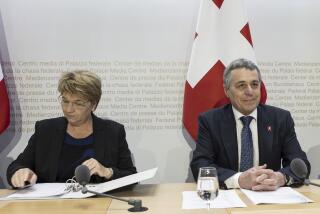Leaders Meet to Discuss Agenda for Europe : Unity: EU is preparing for next year’s convention. Issues range from the dramatic to the mundane.
- Share via
BRUSSELS — It has been billed as a de facto constitutional convention for Europe, a major event that proponents of a more unified Continent hope will bring a single defense force, a united foreign policy and a dominant European Parliament.
But as the leaders of the European Union’s 15 member states gather informally today and Saturday on the Spanish island of Majorca to consider agenda options for the convention, signs point to a much more mundane affair.
The convention, officially known as the Intergovernmental Conference, or IGC, is a mandatory five-year review built into the 1991 Maastricht Treaty, which commits EU member states to eventual full economic and political union. The conference is expected to begin next spring and last through the end of the year.
A report on possible agenda items will be unveiled in Majorca, and the list of issues is impressive.
To create a union “with a genuine external identity,” the report proposes creating an EU foreign minister, “a ‘Mr. or Ms. Common Foreign and Security Policy.’ ”
Such a figurehead would be backed by a separate analysis, forecasting and planning unit and would speak for Europe on foreign affairs, according to the recommendations.
Strengthening the powers of the European Parliament is also listed as “an area for reflection,” as are plans to bring judicial and legal systems of the member states closer together.
But as the leaders take their first step in fixing the conference agenda, a set of less dramatic chores is likely to overtake them.
The most urgent of these is to prepare the EU for expansion to the east and south, which could increase membership to 25 nations within the next decade.
This would entail facing up to a series of less-inspiring, arduous internal reforms such as curtailing the use of the national veto, reducing the size of the EU’s Executive Commission and adjusting voting rights to more accurately reflect a country’s population--a move strenuously opposed by smaller countries such as Luxembourg, population 385,000.
“You can’t seriously consider enlargement without major institutional reform,” said Stanley Crossick, chairman of the Belmont European Policy Center in Brussels. “The alternative would be paralysis.”
The issue of bringing more openness and democracy into the EU’s internal workings is also considered vital if its current remote, faceless bureaucracy is to build some kind of rapport with the individual citizens of Europe.
“Enhancing its legitimacy in their eyes will have to be the prime objective of the coming reform,” the report concluded.
Other factors act to limit the IGC’s agenda.
A lack of political consensus among the member states on how, or whether, to transfer major new powers to Brussels clearly diminishes the prospects for achieving common security and foreign policies. Britain’s Conservative government is opposed in principle to any moves that give the EU control of foreign affairs.
France’s decision to offer its nuclear arsenal as part of an integrated European deterrent just as it has resumed underground nuclear testing in the Pacific has also thrown the EU’s security debate into confusion. Earlier this month, every member country except Britain officially condemned the French tests.
There is also simply the question of time.
Completely separate from the IGC, member states are pressing forward with efforts to create an economic and monetary union by 1999, a task that has begun to consume increasing amounts of political energy.
If that effort is to have even a chance of succeeding, political observers here believe, the IGC must not be allowed to drag beyond the end of next year.
“If we try to do everything, we will end up doing nothing,” said Roldan Ros, a spokesman for Spanish European Affairs Minister Carlos Westendorp, who headed the IGC report team. “We have to look at the calendar and see what is possible.”
While the leaders are expected to discuss their priorities for the conference for the first time in Majorca, the final IGC agenda is expected to be set at a formal EU summit scheduled for December in Madrid.
More to Read
Sign up for Essential California
The most important California stories and recommendations in your inbox every morning.
You may occasionally receive promotional content from the Los Angeles Times.












